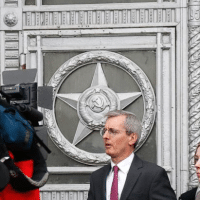-
Corbyn: UK needs ‘war powers act’ after legally questionable Syria strike
The British opposition leader said his country needs the war powers act to limit government’s control over military interventions.
-
Willetts the conqueror (part 5): knowledge exchange
In addition to subsumption of teaching and research, the third mission of neoliberal marketisation has been termed, “knowledge exchange.” The introduction of this mission represents not only a fundamental attack on the academic profession, but also a desperate attempt to marshal the knowledge-producing powers of universities to kick-start a stagnating post-crisis global economy.
-
University strikes: where do we go from here?
On February 22nd the University and College Union (UCU) called for the beginning of a nation wide strike in response to Universities UK’s (UUK) attempt to shift of the Universities Superannuation Scheme from a defined benefit pension to a defined contribution pension.
-
Russia suggests UK possessed nerve agent that is “quite artificially” being linked to Moscow
Russian officials are voicing a full-throated dismissal of British accusations that Russia used a nerve agent referred to as “Novichok” in an attack on former Russian spy Sergei Skripal and his daughter Yulia. The Russian Ambassador to the U.K., Alexander Yakovenko, is further charging London with making accusations in poor faith, while raising questions over whether the poison was already in the possession of the British government.
-
Willetts the conqueror (part 4): audit culture
This reserve army provides an increasing number of desperate and mostly unionised workers to occupy the new, outsourced, deprofessionalised jobs while remind those lucky enough to retain work that they can be replaced if they dare to cause trouble.
-
Nervous about Russia
Two weeks ago in Salisbury, less than 10 kilometres from the UK’s Porton Down chemical weapons establishment, a Russian and his daughter appear to have been poisoned. Sergei Skripal was a former Russian military intelligence officer who acted as a spy for the UK’s MI6.
-
The Skripal poisoning: What lies behind UK-US ultimatums against Russia?
To those who say it is obvious that Russia poisoned Skripal, it is worth recalling the 2001 anthrax attacks in the United States, in which a deadly strain of anthrax was mailed to many U.S. officials in Washington, killing 5 people and infecting 17 more, shortly after the September 11 attacks. There again, media immediately blamed the attacks on obvious targets of U.S.-UK war threats—the Iraqi regime’s weapons of mass destruction (WMD) program and its alleged ties to Al Qaeda. These all proved to be lies, serving Washington’s foreign policy interests as it sought to go to war in Iraq.
-
Reds under the Bed
The British conservative media and party establishment are renewing their attempts to paint Jeremy Corbyn as a traitor. But given the failure of this approach in the past, why would they attempt it again?
-
Utopia and the right to be lazy
Students are much too busy to think these days. So, when a junior comes to talk with me about the possibility of my directing their senior thesis, I ask them about their topic—and then their schedule. I explain to them that, if they really want to do a good project, they’re going to have to quit half the things they’re involved in.
-
‘On new terrain’—How Capital is reshaping the battleground of class war
Since the Great Recession there has been much debate on the nature of capitalism and the crisis of neoliberalism. Often this has resulted in theories which emphasise finance capital, precarious employment, and play to a generally left Keynesian politics, such as that being pursued within the Labour Party currently.
-
Which is more important – challenging class prejudice or promoting class struggle?
A study last year by London University academics highlighted the shocking disparities in pay between individuals from different backgrounds. Most other papers treated this as minor news or ignored it altogether. The Morning Star rightly put it on the front page under the headline Working Class? That’ll be Six Grand off your Salary (and it was the only paper to mention TUC general secretary Frances O’Grady’s call for worker representation on company boards).
-
Eroding the consensus: imperialism, democracy, Zionism & the Labour Party
Science for the People is in the process of relaunching as a publication in the United States. The original magazine archives can be viewed here. Click here to sign the petition to investigate Moshé Machover’s expulsion from the Labour Party. Science for the People (SP): Thank you for speaking with us. As the details of […]
-
UK unions call for energy to be returned to public ownership
The annual congress of the UK Trades Union Congress (TUC) has passed a historic composite resolution on climate change that supports the energy sector being returned to public ownership and democratic control.
-
Work, capital and the ‘administration of punishment’
Criminal justice and welfare policies routinely produce a distinct labour force in Britain, disposable by design. This article examines recent policy developments driving these labour forms, and explores their implications for the meaning of work.
-
DIY politics in the UK
‘If it ain’t broke, don’t fix it,’ goes the old adage; well it is broke. Over the past two years it has become, for many, overwhelmingly obvious that the mainstream media in the United Kingdom is broke.
-
The informal empire of London
The division of the world is not only by classes, but by North and South as well. And unfortunately the British left does not realise that, and the framing of being anti-neoliberal, in contrast to anti-imperialist, denies this differentiated reality.
-
The shifting politics of inequality and the class ceiling
Britain’s class landscape has changed: it is more polarised at the extremes and messier in the middle. The distinction between middle and working class is less clear-cut. The elite is able to set political agendas and entrench their own privilege. The left needs a clear narrative showing how privilege leads to gross unfairness—and effective policies […]
-
Phil Collins: why I took a Soviet statue of Engels across Europe to Manchester
Friedrich Engels spent two decades in Manchester. The horrific conditions he saw in the cradle of industrialism forged his great works. But the city has never commemorated him – until now.
-
Corbyn: shifting the possible
While Jeremy Corbyn didn’t become Prime Minister, he did pull off the most stunning upset in recent political history. And he did this by turning out voters who, according to all received wisdom, would never vote, above all the young and poor.
-
Visions of Corbyn
In a number of recently posted articles (see here) it seemed clear that a UK General Election upset was in the making, despite the tirade of anti-Corbyn commentary from mainstream media in the UK. Now it has happened.




















